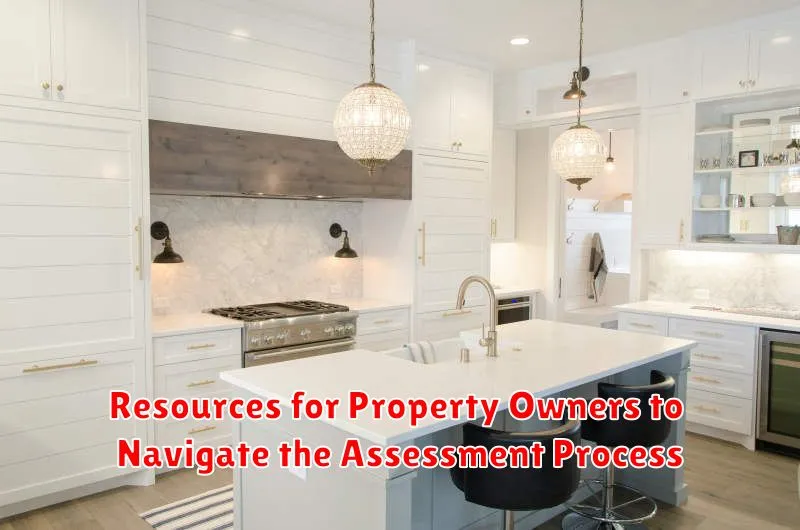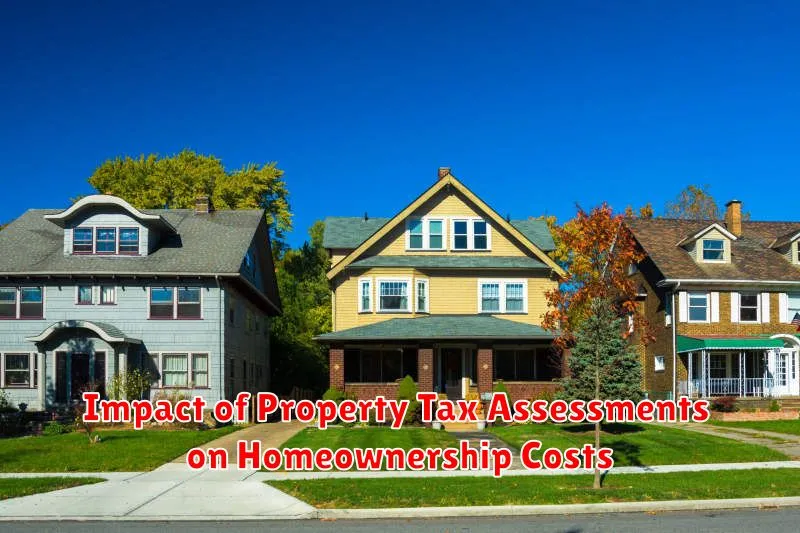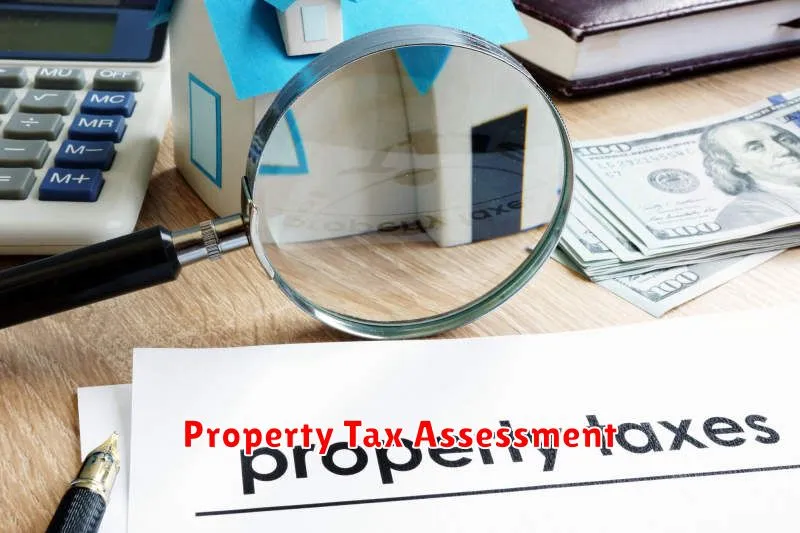Understanding how property taxes are calculated can seem like a daunting task, with many homeowners feeling like they’re navigating a complex and opaque system. But knowing how property tax assessments are determined can give you the power to ensure you’re paying a fair price for your home. Whether you’re a seasoned homeowner or a first-time buyer, understanding the factors that influence your property’s value is crucial for making informed financial decisions.
The property tax assessment process might seem like a black box, but it’s actually a structured evaluation of your home’s worth. This assessment is the foundation upon which your annual property tax bill is calculated. This article aims to demystify the process, shedding light on the key factors that drive your property’s assessed value and empowering you to navigate the world of property tax assessments with confidence.
The Role of Property Tax Assessments
Property tax assessments are the foundation upon which property taxes are calculated. They represent the estimated market value of your property, as determined by the local government. This value is not necessarily the same as what you paid for the property or what you believe it’s worth. Instead, it’s an objective assessment based on factors like comparable sales in your area, the property’s size and features, and the current real estate market conditions.
The purpose of property tax assessments is to ensure fairness in the taxation system. By valuing properties consistently, local governments can levy taxes based on a property’s fair share of the tax burden. This means that properties with higher values will generally pay more in property taxes, while properties with lower values will pay less.
Property tax assessments play a crucial role in the funding of essential public services like education, infrastructure, and public safety. The revenue generated from property taxes is a vital source of funding for local governments, allowing them to provide these services to their residents.
Methods Used to Assess Property Value
Determining the value of your property for tax purposes can seem like a black box, but there are established methods used by assessors. The goal is to determine the fair market value, which is what a willing buyer would pay for your property in a competitive market.
Here are the common methods used:
1. Sales Comparison Approach
This is the most widely used method, especially for residential properties. It involves comparing your property to recent sales of similar properties in your area, considering factors like size, location, age, and condition. This approach relies on the principle of substitution, meaning that a buyer wouldn’t pay more for your property than a comparable one.
2. Cost Approach
The cost approach is used more often for unique or specialized properties, like new construction or properties with unusual features. It estimates the cost of rebuilding your property from scratch, minus depreciation for factors like age and wear and tear. This method works on the assumption that a rational buyer wouldn’t pay more than the cost of replacing your property.
3. Income Capitalization Approach
This method is primarily used for income-producing properties, such as rental apartments or commercial buildings. It estimates the property’s value based on the income it generates, considering factors like rent, vacancy rates, and operating expenses. The principle here is that a property’s value is tied to its ability to generate income.
Ultimately, the assessor will choose the method most appropriate for your property, considering its unique characteristics and market conditions. While the process may seem complex, it’s intended to ensure fair and accurate property tax assessments based on established valuation methods.
Factors Influencing Your Property Tax Assessment
Your property tax assessment is based on the market value of your property, which is what a willing buyer would pay for it in a competitive market. This value is determined by a variety of factors, including:
Location: The location of your property is a major factor in determining its value. Properties in desirable neighborhoods with good schools, low crime rates, and convenient access to amenities tend to be more valuable than those in less desirable areas.
Size and Features: The size of your property, the number of bedrooms and bathrooms, and the types of features it has, such as a pool, fireplace, or finished basement, all contribute to its value.
Condition: The condition of your property is also important. Well-maintained properties with modern updates and upgrades will generally be more valuable than those that are in need of repairs.
Comparable Sales: One of the most important factors used in determining your property tax assessment is the recent sale prices of similar properties in your area. This is known as the comparable sales approach.
Economic Conditions: The overall economic climate in your area can also affect property values. For example, if the economy is strong and there is a high demand for housing, property values tend to increase. Conversely, during periods of economic recession, property values may decline.
It’s important to understand how these factors influence your property tax assessment so that you can take steps to maximize the value of your property. For example, making improvements to your property, such as landscaping or adding a new deck, can increase its value. You can also appeal your property tax assessment if you believe it is too high.
Understanding Your Property Tax Bill
Understanding your property tax bill can feel overwhelming, but it’s crucial for responsible homeownership. This bill, calculated based on your property’s assessed value, contributes to essential public services in your community. It’s important to note that your property tax bill is not determined by your mortgage payment. Property taxes are independent of your mortgage and are levied by your local government.
Here’s a breakdown of how your property tax bill is calculated:
- Assessed Value: This is the estimated market value of your property, determined by local authorities through a process called property assessment. It’s usually a percentage of the property’s fair market value.
- Tax Rate: Each municipality sets its own tax rate, which is expressed as a dollar amount per $1,000 of assessed value. This rate is determined by the local government’s budget and its need for funding for services like schools, police, fire departments, and road maintenance.
- Tax Bill: The final tax bill is calculated by multiplying the assessed value by the tax rate. For example, if your property’s assessed value is $200,000 and the tax rate is $2.50 per $1,000, your annual property tax bill would be $500.
It’s crucial to review your property tax bill regularly to ensure accuracy. If you believe your property’s assessed value is too high, you can appeal the assessment. By understanding the components of your property tax bill, you can stay informed about your financial responsibilities and make informed decisions regarding your property ownership.
How to Appeal a Property Tax Assessment
If you believe your property tax assessment is too high, you have the right to appeal it. This is a common occurrence, as property values can fluctuate, and assessors might not always have the most accurate information.
Here’s a step-by-step guide to appealing your property tax assessment:
1. Understand the Process
Every state has different rules and deadlines for appealing property tax assessments. Contact your local tax assessor’s office to obtain specific instructions for your area. They’ll provide you with the necessary forms, timelines, and guidance.
2. Gather Evidence
To support your appeal, you’ll need to gather evidence showing that your property’s assessment is inaccurate. This could include:
- Recent appraisals or comparable sales of similar properties in your neighborhood
- Photos or documentation of any property damage or depreciation
- Evidence of any errors in the assessor’s data, such as incorrect square footage or property features
- Information about market conditions affecting property values in your area
3. File Your Appeal
Once you’ve collected your evidence, fill out the appeal form provided by your local tax assessor’s office. Be sure to include all relevant details and supporting documents. Submit your appeal within the designated timeframe.
4. Attend the Hearing
In some cases, you may be required to attend a formal hearing to present your appeal. This is an opportunity to explain your case to the assessor and provide further evidence. Prepare your arguments beforehand and be prepared to answer questions.
5. Negotiate or Appeal Further
If your initial appeal is denied, you may have the option to negotiate with the assessor or appeal to a higher authority, such as a property tax board or court. Be sure to familiarize yourself with the appeals process in your state and explore all options available.
Remember, appealing a property tax assessment can be a complex process. Seek professional help from a real estate attorney or tax advisor if you’re unsure about the process or need assistance gathering evidence.
Tips for Lowering Your Property Tax Bill
Once your property has been assessed, you can start taking steps to lower your property tax bill. Here are some tips:
Appeal the assessment: If you believe your property’s assessed value is too high, you can appeal the assessment. This is often the most effective way to lower your tax bill. Be prepared to provide evidence to support your case, such as recent comparable sales in your neighborhood.
Negotiate with your assessor: Sometimes, you can simply negotiate with your assessor to lower your assessment. Be polite and professional, and be prepared to provide evidence to support your case.
Take advantage of exemptions: Many jurisdictions offer property tax exemptions for seniors, veterans, and people with disabilities. Be sure to check if you qualify for any exemptions in your area.
Make improvements to your property: While not always effective, some jurisdictions may lower your property tax bill if you make improvements to your property that increase its value. Be sure to keep documentation of your improvements.
File for homestead exemption: Most jurisdictions have a homestead exemption which is a tax break for primary residences. This can lower your property taxes.
Understand the process: Your assessor will use a number of factors to determine the value of your property. These factors include recent sales of similar properties, the property’s condition, and its location. By understanding the process, you can be better prepared to appeal your assessment.
Common Misconceptions About Property Tax Assessments
Property tax assessments can be a source of confusion and frustration for many homeowners. There are several common misconceptions surrounding how these assessments are determined, which can lead to unnecessary stress and even financial hardship.
Misconception 1: Property taxes are based on what you paid for your home.
The truth is that property tax assessments are determined by the fair market value of your property, not what you paid for it. Fair market value is the price a willing buyer would pay for your property in a competitive market. This value can be influenced by many factors, including recent sales of comparable properties in your area, the condition of your property, and the overall real estate market.
Misconception 2: Property taxes are based on the size of your home.
While the size of your home can be a factor in its value, it is not the only determining factor. Other factors, such as location, amenities, and the condition of the property, can significantly impact its overall value. A smaller home in a highly desirable neighborhood could be worth more than a larger home in a less desirable area.
Misconception 3: Property taxes are based on your income.
This is simply not true. Your income has absolutely no bearing on your property tax assessment. The assessment is based solely on the market value of your property.
Misconception 4: Property taxes are set in stone and cannot be appealed.
While property tax assessments are based on a valuation, they are not always accurate. If you believe that your assessment is incorrect, you have the right to appeal it. This involves providing evidence to support your claim that the assessment is too high. In some cases, this can result in a lower assessment and a reduction in your property taxes.
Understanding how property tax assessments work and dispelling common misconceptions can help you navigate this process more effectively and ensure that you are paying a fair share. By understanding the factors that influence your property’s value, you can be better prepared to challenge an assessment that you believe is inaccurate.
Resources for Property Owners to Navigate the Assessment Process

Understanding how your property is assessed and what your tax obligations are can be a complex and sometimes daunting process. Fortunately, there are many resources available to property owners to help them navigate this journey.
Your first point of contact should be your local assessor’s office. This office is responsible for determining the value of your property and is your primary resource for information about the assessment process. They can provide you with:
- Assessment notices: These documents outline the details of your property’s assessment and how it was calculated.
- Tax rates: The assessor’s office can provide information about the current tax rates in your area, allowing you to calculate your property tax liability.
- Appeal procedures: If you believe your property assessment is inaccurate, the assessor’s office can guide you through the appeal process.
Beyond the assessor’s office, various organizations and resources can offer valuable support:
- State government websites: Most states have dedicated websites with information about property assessments and tax laws. These sites may also offer online tools for calculating property taxes.
- Property tax advocacy groups: Organizations like the National Taxpayers Union offer resources and guidance to property owners navigating complex tax issues.
- Real estate professionals: Real estate agents and appraisers can provide valuable insight into property values and the assessment process.
Remember, understanding your property assessment is a crucial step in managing your finances and ensuring you’re paying your fair share. Don’t hesitate to utilize these resources to gain clarity and navigate the assessment process effectively.
Impact of Property Tax Assessments on Homeownership Costs

Property tax assessments play a crucial role in determining the financial burden of homeownership. The assessed value of your property, which is determined by your local government, directly impacts the amount of property tax you’ll be required to pay. This tax, levied by municipalities, counties, and school districts, contributes significantly to your overall homeownership costs.
A higher assessment means a higher property tax bill, which in turn increases the total cost of owning your home. This can put a strain on your budget, especially if your property value has risen significantly in recent years. It’s important to understand that even if your property’s market value remains unchanged, your assessment may increase due to factors like market fluctuations or reassessments conducted by local authorities.
While property taxes are generally seen as a fair way to fund public services, their impact on affordability cannot be ignored. Rising assessments can make homeownership less accessible for certain individuals and families, particularly those on fixed incomes. This is especially relevant in areas experiencing rapid property value growth, where tax burdens can escalate quickly.
To navigate the potential impact of property tax assessments on your homeownership costs, consider these strategies:
- Stay informed: Regularly check your assessment notice and familiarize yourself with the assessment process in your area.
- Appeal if necessary: If you believe your assessment is inaccurate or inflated, explore the appeals process provided by your local government.
- Budget accordingly: Factor in property taxes as a significant expense when calculating your overall homeownership costs.
- Consider tax relief programs: Some jurisdictions offer programs that provide tax relief to homeowners based on income or other factors. Research these options to see if you qualify.

